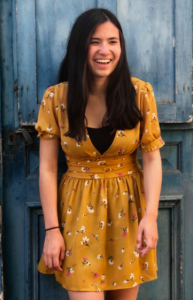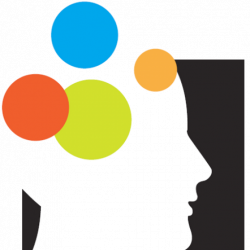By: Akshara Rajeshkannan and Rachel Zhou

Major: Psychology
Year: 3
Home: Vancouver
Preferred pronouns: She/her/hers
Fun fact: I’ve been to a secret restaurant in Thailand with some of my friends. The bouncer was an 8 year old little boy. We had dinner, then they moved all the tables away and it became a club!
A: Could you give us a short overview of your directed studies project? Starting off with your research topic?
My research project is based on the anchoring and adjustment heuristic. A heuristic is a short-cut used by our brain to make decisions, and this heuristic is specifically used when we make decisions under uncertainty. For example, when we ask someone what they think the freezing point of vodka is, generally people will think of the freezing point of water, which is 0°C. That 0°C becomes an ‘anchor’, and people adjust from that value to estimate the freezing point of vodka. I’ve always been interested in learning about decision-making processes, and I found that there’s little to no research regarding the anchoring and adjustment heuristic in kids. My supervisor and I designed a task in order to investigate whether uncertainty will affect children’s use of the anchoring and adjustment heuristic. In my study, children are asked to complete a number line estimation task and indicate where they believe a provided number should be placed on a number line (e.g., “where does 53 go?”). Children are provided with either a plausible anchor (e.g., midway on the line) or an implausible anchor (e.g., around where 20 should go). We believe children will utilize plausible and implausible anchors differently, depending on their degree of certainty.
A: What lab do you work with?
I work with the Center for Cognitive Development, and the PI is Dr. Darko Odic. I joined in my second year, and I was an RA for the 2019/2020 year. I approached Dr. Odic in term 2 of 2nd year about doing a directed studies project. I officially started the project in August 2020, and it ‘officially’ ends April of this year, but will probably continue into the summer.
A: What sparked your interest in your research topic and how did you build your hypothesis?
My project was originally supposed to be on option-generation and decision-making in kids. We were planning to do an in-person eye-tracking study, but when COVID-19 happened, we realised there was no way we could do that. I attended a colloquium series by a professor named Dr. Tom Griffiths, and he spoke about the anchoring-adjustment heuristic, which is what sparked my interest in the new topic. How we built our hypothesis is a little complicated! In my literature review, I found (1) evidence that adults use the anchoring and adjustment heuristic and (2) evidence that an adult’s degree of uncertainty affects their use of anchors. My literature review also revealed that kids have a certain understanding of numbers between 0-100, but an uncertain understanding of numbers between 0-1000. Based on this information, we predict that children will accept implausible anchors if their degree of uncertainty is high (specifically, when they make estimations in the 0-1000 condition).
A: Was there anyone who inspired you to look into this topic?
Dr. Odic, definitely. He gave me different papers to read and he was the one who recommended I attend the colloquium. Dr. Luke Clark as well, who teaches Psyc335, Gambling and Decision-Making. The class content was coincidentally relevant to my study! I am currently developing a project with Dr. Clark that will begin this summer.
R: What was your favourite part of the process?
My favourite part of the research process was devising the study, which was also the most difficult part since no previous studies have examined the anchoring and adjustment heuristic in children. It felt great when we finally decided to use a number estimation task, since most 6-to-7-year-old children are familiar with numbers ranging from 0-100. The idea came to me as I was reading papers on number estimation; I looked into some more literature and discussed the idea with Dr. Odic.
R: Is there anything you can share with us about the results that you found? What trends/conclusions did you observe?
Although we’re still in the piloting process, preliminary results do show that kids have a good understanding of numbers between 0 to 100 and a pretty bad understanding of numbers between 0 to 1000. The current results are in line with our expected hypothesis.
R: What will you be doing with your data and conclusion now? How do you plan on presenting it?
I will be presenting this project at MURC (Multidisciplinary Undergraduate Research Conference), and PURC (Psychology Undergraduate Research Conference) which is coming up in April. I also had the opportunity to present past research I conducted with the Centre for Cognitive Development at the Harvard National Collegiate Research Conference (NCRC-HCURA) this year. I was really nervous but learned a lot while networking with the inspiring speakers at the conference, such as the researcher who developed the Implicit Association Test. I haven’t been to an actual in-person conference yet due to COVID but the Harvard NCRC was a live event where we could interact with each other and ask questions.
A: How do you see the results of your study being applied in the real world?
Decision-making is a super complex process, and to better understand adult decision-making, I think it’s really important to evaluate the development of decision-making processes in children first. I think this study can inform future developmental research in heuristics, and also what role certainty plays in children’s decision-making strategies.
A: If you could do your study again, what would you do differently and why? I know you haven’t finished your study yet, but is there anything you would’ve done differently at the start?
I wish I had more of an involved role in the coding of the study. I don’t have much coding experience, and I wish I had worked on my coding skills a bit more before I started the project. The program used to run the study is super fun though, it has an ocean background, and every time a child clicks a number, a pellet drops out and a fish comes up and eats it. It’s like a little game to keep children engaged during the study.
A: How has your project helped you grow, both personally and professionally?
Academically, I think I was very lucky to be involved in every step of the research process, from the lit review, the design, to actually running the study. I don’t think that’s something I would’ve ever gotten from class or even from being an RA. It’s also helped me figure out that this is what I want to do. I’m definitely set on going to grad school for psychology, and hopefully become a researcher. It’s also helped me become a lot more organised—my calendar is my life now, and I have no idea how I survived without it in my first year!
R: What course(s) do you think were most helpful in gaining background knowledge about your research topic?
Surprisingly, WRDS 150 (Writing and Research in the Disciplines) with Dr. Jennifer Cowe helped me a lot because I learned how to read academic papers and write literature reviews. This course acts as a transition into university for people who have never read research papers before. I was better able to read, understand, and analyze the papers strategically. In that class, I wrote a research paper on how the Singaporean government used nostalgia to make their citizens feel a sense of national pride during the country’s 50th national day. Other than that, a psychology course that has helped me with my research was Dr. Luke Clark’s PSYC 335 (Gambling and Decision-Making). In the class I learned about the dopamine system and other cognitive processes, which are all relevant to my study.
R: What was the most challenging part about doing a directed studies project?
The most challenging part was definitely designing the task because it took us a few weeks to come up with the number-line paradigm. I was constantly reading papers about decision-making and anchoring and adjustment heuristics! Taking the time to let all the ideas sink into my mind finally led to a rewarding result.
R: How did you prioritise your time during the DS project? How do you motivate yourself?
It’s important to set specific blocks of time to work on the project especially since we are working from home. Otherwise, it’s really easy to get overwhelmed. I see my DS project as a class, where I have specific meetings with my supervisor but I also work on it at a certain time every other day like I would with a class. The structure allows me to stay organized and also allows me to take breaks when I need them. Coming up with the idea and seeing it evolve from scratch gives me motivation. I was so excited to test participants and see how kids react to the fish and other animations in the experiment. Also, knowing the project is helping me achieve my goal of attending grad school is another great motivator.
R: How do you network within the psychology community, and where have you made your most valuable connections?
I think joining the PSA is a great way to network. I’m on the academic committee, and I work with Aakanksha who is the VP Academic. We are actually putting on PURC this year, so it is a great way to get more involved with research on campus. I’m also an exec at the UBC Mental Health Initiative, which has an incredible team of passionate individuals. Running monthly mental health missions has been a great way to connect with more people. Also, joining labs has been a great way to network with professors and grad students. I applied to many labs back in second year, so I’m currently also an RA at the MAGIC lab, directed by Dr. Kristin Laurin. The grad student I work with is named Holly, and she’s been super sweet and supportive the whole time. I’ve found that people within the psychology community tend to be really nice and approachable, and I enjoy working with all of them!
A: What are your other interests outside of Psychology? Are you a part of any clubs or teams?
I’m a Starbucks barista! I have awesome co-workers and I love getting free coffee. I also love teaching, I was a tutor at Kumon for years. I started at Kumon when I was around 7 years old, and I literally transitioned from being a student to a teacher and didn’t leave until I was 19. Kumon is literally a part of my soul at this point haha! In addition, I’m the VP of Operations for a non-profit tutoring organization in B.C. called ‘Mentoring the Stars’ foundation. We offer free tutoring for British Columbian families, and our organization was initially created to help with the transition to online learning.
A: What are your professional goals and plans for the future? What do you see yourself doing in 10 years time?
Right now my goal is to go to grad school, and pursue a PhD in Psychology. I love the UBC Psychology department, so I’d like to continue my education here, but I’m open to looking at other schools too.
A: Is there anything important you’d like to say that I haven’t asked you about?
I would just say to anyone that is even remotely interested in research to just give it a try! I was apprehensive about research at first and I didn’t think I would like it but joining a lab in my second year was probably the best decision I made at UBC!

